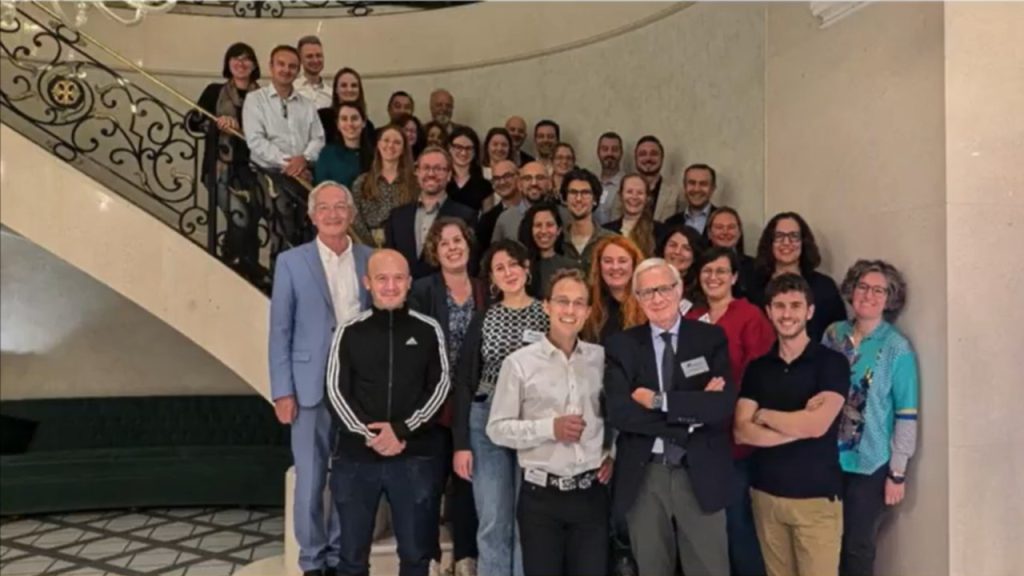Menu

Estefania Huergo (postdoctoral researcher at Navarrabiomed, Navarra, Spain) presented findings on epigenetic signatures derived from whole blood in patients with acutely decompensated cirrhosis. Results from the PREDICT and ACLARA cohorts highlighted the prognostic value of global methylation levels in predicting adverse outcomes.
Richard Moreau (Director of EF CLIF, Barcelona, Spain) provided a detailed analysis of whole blood RNA-sequencing data, identifying gene signatures associated with the progression to acute-on-chronic liver failure (ACLF) and increased mortality risk within 28 and 90 days. He emphasized the significance of white blood cell transcriptome changes in patients who develop ACLF.
Johanna Reissing (postdoctoral researchers at University Hospital Aachen, Aachen, Germany) presented data linking specific microRNAs (miRNA) with disease progression, length of stay in the intensive care unit, and transplant-free survival in patients with cirrhosis. These findings suggest a strong potential for miRNAs as predictive biomarkers for disease progression.
Cristina López-Vicario (postdoctoral researcher at Institut d’Investigacions Biomèdiques Pi i Sunyer (IDIBAPS), Barcelona, Spain) shared updates on the analysis of plasma inflammatory proteins, lipid mediators, and metabolic pathways, identifying biomarkers linked to mitochondrial dysfunction and inflammation in patients with acutely decompensared cirrhosis at risk of developing ACLF.
Pierre-Emmanuel Rautou (Coordinator of DECISION, and Professor at Paris-Cité University and Hospital Beaujon AP-HP, Clichy, France) presented results on plasma extracellular vesicle signatures. A multivariate competing risk analysis of variables associated with mortality within the PREDICT cohort, suggested a relationship between the concentration of plasma large extracellular vesicles and mortality rates in patients with acutely decompensated cirrhosis. The analysis indicated a correlation between the levels of large extracellular vesicles and predictive clinical scores, highlighting consistent trends in both the PREDICT and ACLARA cohorts.
Frank Uschner (physician at University Hospital Münster, Münster, Germany) presented progress in preclinical models aimed at evaluating new combinatorial therapies. These models successfully replicated key features of ACLF, including multiple organ failure, showing promising results in testing safety of albumin and enoxaparin combinatorial therapy.
David Gomez-Cabrero (Associate Professor at Navarrabiomed, Navarra, Spain) reported advancements in patient stratification using multi-omics data. His team aims to identify key features that improve the prediction of outcomes in patients with decompensated cirrhosis, using RNA-sequencing, metabolomics, lipidomics, and cytokine profiles.
Paolo Caraceni (Full Professor at University of Bologna, Bologna, Italy) outlined the design and objectives of the COMBAT trial, a phase II study assessing the safety and tolerability of a combinatorial therapy combining human albumin and enoxaparin. This study will include 90 patients with acutely decompensated cirrhosis to evaluate key outcomes including safety of the combinatorial therapy, as well as infection rates, organ failure, and survival.
Additionally, Caraceni discussed the PROSPECT observational study set to evaluate novel biomarkers identified within the DECISION project, with a focus on predicting survival at three months and characterizing the clinical trajectories of patients post-hospitalization.
Tamara Berghammer (Communications Manager at concentris, Fürstenfeldbruck, Germany) emphasized the importance of disseminating project findings to a wide audience as soon as possible. A project dedicated website and social media channels are essential tools to communicate research outputs to project stakeholders from medical professionals and scientists to patients, industry experts and the general public. Over the last year, the DECISION project has been featured at relevant internationally attended conferences, with a prominent appearance of Consortium members contributing to increase the influence of the project.
With several manuscripts in preparation and expected to be published early next year, future communications and dissemination efforts will focus on a wider range of media coverage and on making new knowledge open and accessible to potential users, encouraging further exploitation of research results and outputs.
The General Assembly concluded with Pierre-Emmanuel Rautou, who summarized the progress made in identifying new therapeutic strategies and biomarkers for acutely decompensated cirrhosis and ACLF. He reiterated the consortium’s commitment to translating these findings into clinical practice, ultimately improving patient outcomes.
Hermann Mucke (CEO of H.M. Pharma Consultancy, Vienna, Austria) and Dominique Valla (Professor at Paris-Cité University, Clichy, France) for and on behalf of the Scientifc and Ethical Advisory Board provided valuable feedback to members of the Consortium and highlighted the significant achievements of this collaborative research effort, emphasizing its impact on the field.
The DECISION project continues to build momentum towards the development of novel treatments and prognostic tools for chronic liver disease, with a focus on multi-omics data integration, relevant preclinical models, and clinical trials designed to achieve its objectives.
The primary objective of the COMBAT trial – A novel combinatorial therapy with albumin and enoxaparin in patients with decompensated cirrhosis at high-risk of poor outcome – is to determine if a combinatorial therapy based on the administration of human albumin and enoxaparin is safe and effective in patients with decompensated cirrhosis discharged from the hospital.
ClinicalTrials.gov Identifier: NCT05895136

This study received funding from the European Union’s Horizon 2020 research and innovation programme under grant agreement no. 847949.
Cristina López-Vicario is supported by the Centro de Investigación Biomédica en Red de Enfermedades Hepáticas y Digestivas (CIBEREHD), Instituto de Salud Carlos III, Spain.
European Foundation for the Study of
Chronic Liver Failure
Avinguda Diagonal 477, 11th floor
08036 Barcelona, Spain
Tel: +34 93 227 14 00
Email: Send us an email
© 2025 European Foundation for the Study of Chronic Liver Failure

| Cookie | Duration | Description |
|---|---|---|
| cookielawinfo-checkbox-analytics | 11 months | This cookie is set by GDPR Cookie Consent plugin. The cookie is used to store the user consent for the cookies in the category "Analytics". |
| cookielawinfo-checkbox-functional | 11 months | The cookie is set by GDPR cookie consent to record the user consent for the cookies in the category "Functional". |
| cookielawinfo-checkbox-necessary | 11 months | This cookie is set by GDPR Cookie Consent plugin. The cookies is used to store the user consent for the cookies in the category "Necessary". |
| cookielawinfo-checkbox-others | 11 months | This cookie is set by GDPR Cookie Consent plugin. The cookie is used to store the user consent for the cookies in the category "Other. |
| cookielawinfo-checkbox-performance | 11 months | This cookie is set by GDPR Cookie Consent plugin. The cookie is used to store the user consent for the cookies in the category "Performance". |
| viewed_cookie_policy | 11 months | The cookie is set by the GDPR Cookie Consent plugin and is used to store whether or not user has consented to the use of cookies. It does not store any personal data. |